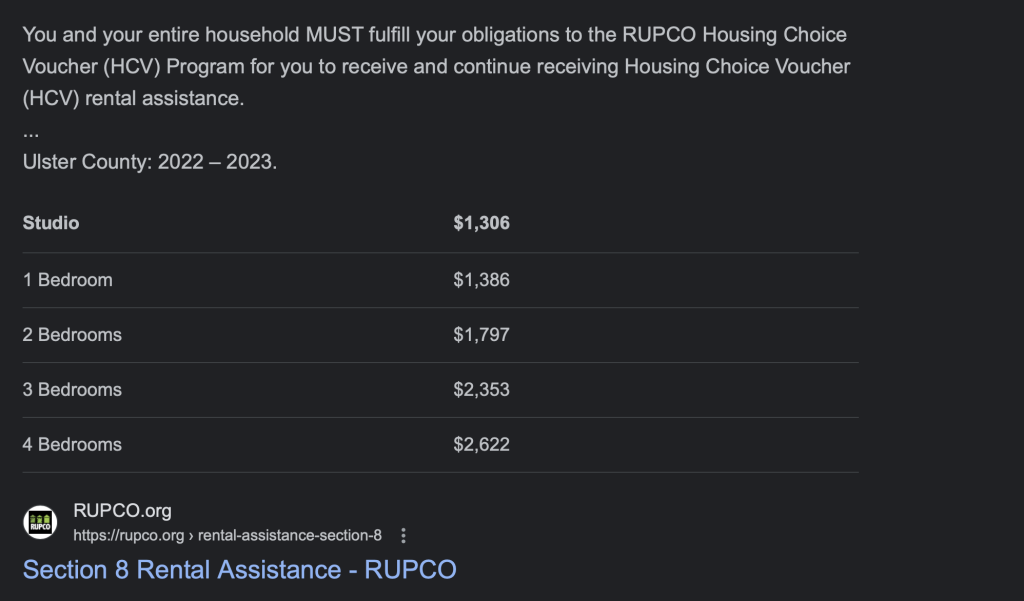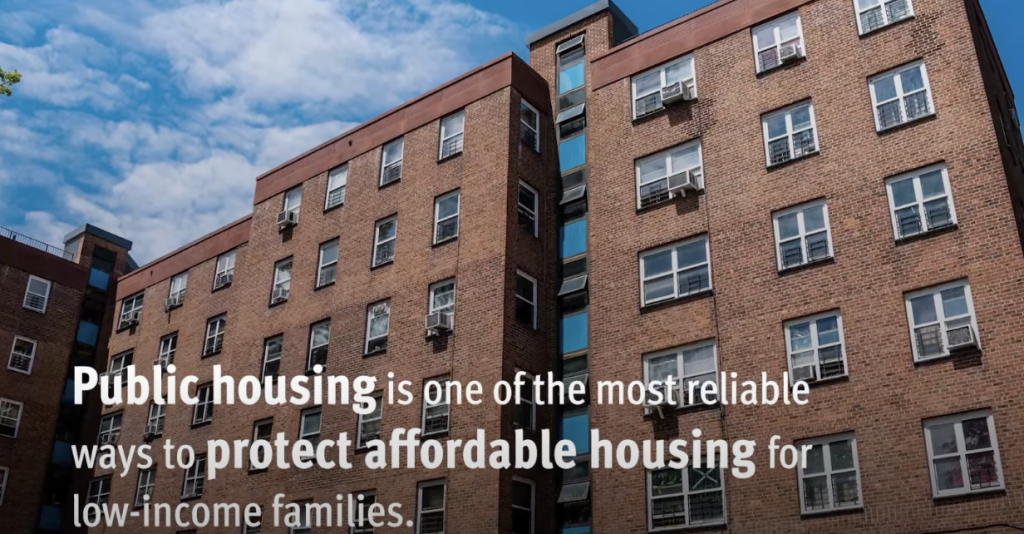By Rebecca Martin
At the recent Kingston Common Council Laws and Rules Committee meeting on April 19, Director of Housing Initiatives Bartek Starodaj provided an update on Kingston Forward and Kingston’s Form-Based-Code environmental review process, announcing that the zoning code would be in front of the common council (the lead agency of the review process) soon for a vote. There was alot presented that included Parking Standards, SD Waterfront, Density, Short Term Rentals in Accessory Dwelling Units, Minimum Parking Amendments and Inclusionary Zoning Provisions.
The Kingston common council will be presented with a final Common Council Zoning Discussion #3: Implementation and Enforcement “deep dive” on Monday, April 24 at 6:30pm. The meeting is open to the public.
HUD vs. ACS for Kingston AMIs
The Inclusionary Zoning Provision segment outlined that for seven (7) or more apartment units, the Area Median Income (AMI) is being proposed at 80% for affordable and 120% for workhouse housing units (the percentage for workhouse in the 2.0 version increased by 20% in the 3.0 version).
120% AMI is considered market rate housing.
According to Starodaj, the AMI was set by the US Department of Housing and Urban Development (HUD) where both the City of Kingston and Ulster County AMI numbers were the same. But Ward 9 Council Member Michelle Hirsch pointed out that the American Community Survey (ACS) data, which is an ongoing survey that provides data each year about the social, economic, housing and demographic characteristics of communities, shows that the City of Kingston’s AMI is nearly $30,000 less than Ulster County’s. For a household of four people, 80% AMI in Kingston was $47,072 while Ulster County was $76,800. Hirsch also shared concern that those who rely on Section 8 Housing Choice Vouchers (HCV), a program that enables the lowest income households in NYS to rent decent, safe housing in the private housing market by providing rental assistance, would unlikely be able to find or afford an apartment in the City of Kingston.
Meanwhile, Bartek expressed concern that by “deepening” these percentages for those living in Kingston under 80% AMI could lead to chasing away developers from building in Kingston.
A new housing study for Kingston?
The City of Kingston has changed dramatically since it adopted its most recent comprehensive plan on April 5, 2016 and Kingston, like most communities around the US, got hammered during and following the pandemic. Council member Hirsch asked if the City of Kingston had a housing study that would look at all the AMIs and current housing stock in the community to provide the city with a plan to help make good decisions about setting housing standards now. “The whole point of Form-Based-Code is to provide housing for people that need housing and can’t afford it. The incomes in Kingston don’t line up with what is being proposed here.” she said.
PILOAH and Affordable Housing Fund
“The fear is that if the developer can’t find a way to cover affordable units in it’s development they will walk away.” – Bartek Starodaj
Recently, KingstonCitizens.org wrote about the city proposing a policy that would allow developers to be able to opt-out of 10% Affordable Units with a Payment-in-Lieu-of Affordable Housing. It included an Affordable Housing Fund as a placeholder without any clarity on policy and procedure that turned up in recent version (3.0) of the Kingston Form-Based-Code. Later, we stumbled across a request for proposal (RFP) from December of 2022 with a timeline for the city to hire a consultant for guidance on creating the fund by April even though a PILOAH hadn’t yet been adopted.
We followed up with Bartek in an email to ask what had become of the RFP where we copied local housing advocates and members of our common council. He confirmed that the city had established an RFP committee for this project, which included a representative from the Common Council (when we asked Council President Andrea Shaut, who would typically assign a council member to serve in this manner, she told us that she wasn’t aware of the committee or who from the council participated) and after reviewing the submission (s?) earlier this year ultimately declined to hire a consultant. We asked for minutes and to learn who served on that committee, what consultants responded and why the city chose not to proceed. After several attempts, we were told to submit a Freedom of Information Law (FOIL) in order to receive that information.
During the Laws and Rules committee meeting, Barbara Graves-Poller, the City of Kingston’s Corporation Counsel, said that she would provide the council with information about the PILOAH and the Affordable Housing Fund in the coming days. Hopefully during tomorrow’s public “deep dive” that information can be shared publicly.
Parking requirements are one of the real barriers to creating affordable housing in Kingston
Michael Kodransky, a new resident in the City of Kingston and an urban planner, waited hours that evening in order to provide the council with his COMMENTS on what the city needed to do in order to remove barriers for the creation of more affordable housing.
‘’What stirred my desire to share comments, is being alarmed around parking requirements of the Kingston and Ulster County planning board recommendation around the minimum parking requirements. I have been working with around 10 other people (residents) in Kingston who are equally alarmed. They include parking similar to euclidean zoning and that is not what form-based-code is. If you haven’t been following the news lately (Harpers Magazine: Lots to Lose), parking is in the news quite a lot, and the reason is is because housing crisis in Kingston is a national crisis, there’s a shortage of housing all across the nation and it’s forcing municipalities to reevaluate their parking regulations if they exist. And those municipalities like Buffalo, Hartford, that are abandoning their parking regulations are seeing new development.”
“At this juncture in Kingston to consider putting in parking requirements when there is a housing shortage, when we know according to the 2030 climate action plan that 40% of climate emissions come from driving trips, studies increasingly show that the inclusion of parking undermines multi-model policies. We don’t have any travel demand management ordinance in the city or any understanding of existing private parking that currently exists. It seems like the planning board at the city and county did a copy and paste job from guide books that are being abandoned all over the county. It’s like they haven’t been paying attention to what’s been happening over the last 20 years in the urban planning space. Every week, a new municipality around the country is abandoning their parking requirements…to see the planning board in Kingston and Ulster County recommend to put them in does not make any sense.”
“I encourage the common council to seriously look into this issue, because it increases the cost of construction, and it doesn’t seem as though the planning board on either the city or county level has spoken to any small or medium scale developers to see how this impacts their financial feasibility or banks or insurance to understand what the underwriting for small scale developments would be with these types of requirements. Essentially, these councils and boards are making market intervention recommendations without actually understanding the market implications and the implications on the production of housing. The costs of these types of requirements trickle down to everything else. Services, too.”
“That is correct.” said Ward 3 council member Rennie Scott Childress. “We agree with you.” said Ward 4 Rita Worthington
“I encourage you to accept the code that the consultant proposed with no parking requirements. There’s a reason they did that. They listened to what people were saying and what the policy outcomes were that we asked for which is affordable housing. A place that’s connected and affordable. This is an irrational burden for developers and the community. Listen to what the consultants proposed, there is a reason. The public was asking for these outcomes that were reflected in the consultant’s recommendations.”
Mic drop.



